 The founders of Marxism, Marx and Engels, participated in the “International Workingmen's Association” from 1864 to 1872, where they found their first base of support and a connection with the workers' movement. Based in London, the International found supporteres across Europe and in the U.S.A. The founders of Marxism, Marx and Engels, participated in the “International Workingmen's Association” from 1864 to 1872, where they found their first base of support and a connection with the workers' movement. Based in London, the International found supporteres across Europe and in the U.S.A.
|
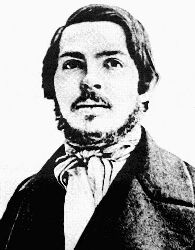 Karl Marx & Fredrick Engels (1818-1883)/(1820-1895) 1,000+ Karl Marx & Fredrick Engels (1818-1883)/(1820-1895) 1,000+ 
Founders of Marxist practice and philosophy. Established the ground work of Marxism through an examination of the rise of capitalism, the history of society, and critique of many prevailent philosophies. Established the First International Workers' organisation.
[Marx Biography] [Engels Biography] |
Wilhelm Liebknecht (1826-1900) 10+
German Revolutionary, comrade of Marx in the Communist League in the 1840s.
[Biography]
Friedrich Adolphe Sorge (1826-1906) < 5
After fighting in the 1848 Revolution in Germany, he fled to America; later Secretary of the First International; Marx's closest supporter in the US.
[Biography]
Joseph Dietzgen (1828-1888) < 5
Created dialectical materialism independently of Marx & Engels, but on seeing their writings became their most ardent supporter. His main contributions were using dialectics to elaborate epistemology.
[Biography]
August Bebel (1840-1913) 10+ 
Co-founder of the German Social Democracy with Wilhelm Liebknecht in 1869. Part of the Reichstag from 1867. Outstandingly argued for the emancipation of women's rights before capitalism could be overthrown.
[Biography] | “The Communists disdain to conceal their views and aims. They openly declare that their ends can be attained only by the forcible overthrow of all existing social conditions.
Let the ruling classes tremble at a communist revolution.
The proletarians have nothing to lose but their chains. They have a world to win.”
Paul Lafargue (1841-1911) 30+ 
A member of the Paris Commune. Staunch advocate of Women's rights, wrote also on the history of religion, morals, literature, language, and comedy. Married to Marx's second daughter, Laura.
[Biography]
Jenny Marx Longuet (1844-1883) < 5
Fought for Irish independence from England. Detailed the attrocities against Irish political prisoners in England. Braved a narrow escape from France after the massacres of the Paris Commune. Marx's eldest daugthter.
[Biography]
Jules Guesde (1845-1922) < 5
French socialist. Leader of the Marxist wing of the French workers' movement.
[Biography]
|
 In the 1880s, militant workers' movements grew up in all the capitalist countries. Marxists built powerful social-democratic parties which gave political leadership to these movements and transformed Marxism into a worldwide, mass movement. In the 1880s, militant workers' movements grew up in all the capitalist countries. Marxists built powerful social-democratic parties which gave political leadership to these movements and transformed Marxism into a worldwide, mass movement.
|
Karl Kautsky (1854-1938) 60+ 
Helped create the German Social-Democracy, one of the best-known theoreticians of the Second International, and a leading proponent of Marx & Engels after their death. During and after World War I he became a pacifist.
[Biography]
William Morris (1834-1896) 300+
Helped create the Socialist League (with E. Marx). An artist who became a revolutionary communist through his search to address the lack of creative and artistic freedom allowed in the capitalist work process. Wrote fiction on far in the future Communist societies.
[Biography]
Henry Hyndman (1842-1921) 5+
Founder of Britain’s first socialist party, the Social Democratic Federation, but did not follow the SDF into the Independent Labour Party and supported the War.
Edward Carpenter (1844-1929) < 5
English socialist poet, anthologist, early gay activist and socialist philosopher.
[Biography]
Annie Besant (1847-1933) < 5
British socialist, women's rights activist, writer and orator and supporter of Irish and Indian self rule.
[Biography]
E. Belfort Bax (1854-1925) 300+
Among the first sources for many Marxist and materialist ideas in English. Founding member of Social Democratic Federation. Popularised Marxist approach to French Revolution in English.
[Biography]
Eleanor Marx (1855-1898) 15+
Helped formed the Socialist League (with W. Morris), and wrote extensively in its paper. Wrote extensively on women's issues. Organizing, writer, record-keeper, and speaker for militant trade unions such as the Gasworkers, and the Dockers Union.
[Biography]
Harry Quelch (1858-1913) 5+
Founding member of British Social Democracy.
[Biography]
Dora Montefiore (1851-1933) 100+
British feminist and founding member of the British Communist Party.
[Biography]
Tom Mann (1856-1941) < 5
British trade union organiser and founding member of the British Communist Party, founder of IWW and Marxist movement in Australia.
[Biography]
Max Beer (1864-1943) 5+
German-born Jewish socialist journalist and historian, British Social-Democrat; worked with Riazanov at the Institut für Sozialforschung.
[Biography]
Theo. Rothstein (1864-1943) 20+
Russian emigré British Social Democrat; returned to Russian after the Revolution and worked as a diplomat.
[Biography]
Early American Marxism.
Daniel DeLeon (1852-1914) 1,000+ 
Helped create the IWW. Developed one of the most detailed outlines of how Socialist society should function. Believed that democratic control of all industries and services must be held by workers organised into industrial unions.
[Biography]
Eugene Debs (1855-1926) 40+
Helped build the American Railway Union, and later the American Socialist Party. Arrested for his political criticism of WW1, won almost a million votes for U.S. President while in prison.
[Biography]
——————
James Connolly (1868-1916) 300+ 
Helped create the Irish Socialist Republican Party in 1896; served as Secretary of the Transport and General Workers Union. Executed for his leading role in the Easter Rising.
[Biography]
E.H. Lane (1868-1954) <5
Australian Communist journalist, brother of Utopian William Lane.
| Antonio Labriola (1843-1904) < 5
Among the first Italian Marxists, he was a writer and philosopher. Criticized the theories of Hegel, Nietzsche, Croce, and neo-Kantiansim.
[Biography]
August Palm (1849-1922) < 5
Founder of Swedish Social-Democracy.
[Biography]
Vera Zasulich (1851-1919) < 5
A founder with Plekhanov of the Emancipation of Labour Group, and a translator of Marx's works into Russian; later joined the Mensheviks.
[Biography]
Georgi Plekhanov (1856-1918) 20+ 
Helped create the Russian Social-Democratic party, becomming a Menshevik after the split in the party, but he tried to keep the party united. Believed that capitalism need to grow up before socialism was possible; thus he opposed the Soviet government.
[Biography]
Julius Martov (1873-1923) < 5
Originally close collaborator of Lenin, split with him in 1903 and became leading Left Menshevik and critic of Bolshevism.
[Biography]
——————
Gabriel Deville (1854-1940) < 5
One of the founders of the Second International in France.
[Biography]
Enrico Ferri (1856-1929) < 5
Italian Marxist of the Second International, criminologist.
[Biography]
Sen Katayama (1859-1933) 5+
Born Yabuki Sugataro, jailed for striking in 1912, left Japan for the US, where he became a Communist, and as an officer for Comintern he became in 1922, co-founder of the Japan Communist Party, left Japan and remained in the Soviet Union until his death.
Franz Mehring (1846-1919) < 5
Writer, historian, member of German Social Democrats and the Spartacist League.
[Biography]
Clara Zetkin (1857-1933) 10+
Leader of the international women's movement. National Executive member of the German Social Democratic party. Long time comrade of Rosa Luxemburg, helped create the Spartacists and German Communist Party. Supported the Soviet government.
[Biography]
Rosa Luxemburg (1871-1919) 60+ 
Championed the idea of the mass strike. Tireless opponent of WWI, she renounced the German Social Democracy, helped to create the Spartacus League, and later the German Communist Party. Critical of the Soviet government. Executed by the German government.
[Biography]
Karl Liebknecht (1871-1919) < 5
"Karl Liebknecht called upon the workers and soldiers of Germany to turn their guns against their own government. Karl Liebknecht did that openly from the rostrum of parliament (the Reichstag) [of which he was a deputy – he was the only member of government to do so]." Executed by the German government.
[Biography]
August Thalheimer (1884-1948) 10+
German socialist, founder member and theorist of the German Communist Party.
[Biography]
See also: Wilhelm Liebknecht, August Bebel, Wilhelm Pieck
——————
Rudolph Hilferding (1877-1941) < 5
German socialist and political economist.
[Biography]
Otto Bauer (1881-1938) < 5
Major theorist of “Austro-Marxism” in the “2½ International.”
[Biography]
Ber Borochov (1881-1917) < 5
Marxist-Zionist and one of the founders of the Labour Zionist movement.
[Biography] |
| See also: Paul Lafargue, Jules Guesde, Vladimir Lenin, Leon Trotsky, Leon Kamenev, Sylvia Pankhurst, Vida Goldstein. |
|
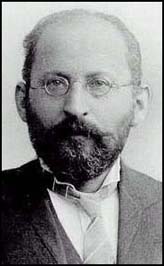 “In all advanced countries we see the privileges of the capitalist bourgeoisie yielding step by step to democratic organisations.” “In all advanced countries we see the privileges of the capitalist bourgeoisie yielding step by step to democratic organisations.”
Eduard Bernstein
(1850-1932) 10+ 
A close associate of Engels and an early Marxist, Bernstein came to believe that capitalism could be made more and more democratic so that a socialist revolution would be unnecessary and irrelevant.
[Biography]
Jean Jaurès (1859-1914) 10+
Popular French socialist. Founder of l'Humanité.
[Biography]
Hjalmar Branting (1860-1925)
A founder of Swedish social democracy.
[Biography]
Alexander Kerensky (1882-1970)
Member of the Russian Socialist Revolutionary Party; was leader of the Provisional Government when overthrown by the Bolsheviks in October 1917.
[Biography]
Bruno Rizzi (1901-1977)
Italian socialist, critic of bureaucracy.
[Biography] | 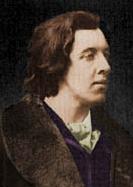 Oscar Wilde (1854-1900) Oscar Wilde (1854-1900)
Irish poet and playwrite who was also a socialist.
[Biography]
George Bernard Shaw (1856-1950)
Irish writer and playwrite, comrade of Eleanor Marx, Edward Aveling, and William Morris, later joined the Fabian society, a circle of intellectuals who advocated reform to avoid revolution.
[Biography]
H.G. Wells (1866-1946)
Radical science fiction author who used his novels to warn of the dangers of capitalism.
[Biography]
——————
Michael Davitt (1846-1906)
Radical Irish social reformer, founder and leader of the Irish Land League, which fought for radical land reform.
[Biography]
Upton Sinclair (1878-1968)
Radical American writer who exposed the conditions of the poor in the industrial cities of the U.S..
[Biography]
|
 Social-democracy was unable to prevent the First World War, and only one section – the Bolshevik Party in Russia, was able to overthrow their government, pull out of the war and institute a socialist policy. The Bolsheviks called on the workers of all countries to come to their aid. Social-democracy was unable to prevent the First World War, and only one section – the Bolshevik Party in Russia, was able to overthrow their government, pull out of the war and institute a socialist policy. The Bolsheviks called on the workers of all countries to come to their aid.
|
Vladimir Lenin (1870-1924) 1,000+ 
Helped create the Bolshevik party. Led the Soviets to power in the Russian Revolution. Elected to the head of the Soviet government until 1922, when he retired due to ill health. Created the Communist International. Created the theory of Imperialism, emphasised the importance of the political party as vanguard in the revolution.
[Biography]
Maxim Gorky (1868-1936) 5+
World-renowned writer of fiction, Gorky first focused on the plight of societal outcasts in Russia, then turned his attention to the struggles of the working class.
[Biography]
Nadezhada Krupskaya (1869-1939) < 5
Bolshevik Revolutionary. Writer, educator and Secretary of the Party. Wife and advisor to V.I. Lenin. Secretary to the Board of Iskra beginning in 1901. Brought recognition of International Women's day to Russia.
[Biography]
David Riazanov (1870-1938) < 5
Historian and Archivist of Marxism, helped create the Marx-Engels Institute. Political prisoner of Stalinism, died in prison.
[Biography]
Alexandra Kollontai (1872-1952) 30+ 
Bolshevik Revolutionary. Led the Workers' Opposition, which opposed party control of trade unions and believed in industrial unionism. First woman ambassador in history. Proponent of free love, she wrote extensively on women's and other social issues.
[Biography]
Georgi Chicherin (1872-1936) 20+
One-time Diplomat and Social-Revolutionary, appointed Minister for Foreign Affairs for the Bolsheviks in 1918.
[Biography]
Christian Rakovsky (1873-1941) 5+
President of Soviet Ukraine, worked to make the Soviet Ukrainian identity independent of Russia. Helped create the Left Opposition, seen as its ideological leader. Explained Socialist economics. Political prisoner of Stalinism, died in prison.
[Biography]
Alexander Bogdanov (1873-1928) < 5
Russian Doctor, an old Bolshevik expelled in 1909 as an ultra-left. Also a writer, after the Revolution dedicated himself to science.
[Biography]
Anatoly Lunacharsky (1875-1933) 5+
Bolshevik Revolutionary, outstanding orator. Commissar for Education in the Soviet government. Historian and archivist of Russia, he wrote extensive, personal biographical portraits on the leaders of the revolution.
[Biography]
Cecilia Bobrovskaya (1876-1960) < 5
Bolshevik who wrote a celebrated history of her experiences.
Mikhail Tomsky (1880-1936) < 5
Old Bolshevik, trade unionist.
[Biography]
F.F. Raskolnikov (1892-1939) < 5
Bolshevik sailor who chronicled the October Revolution.
| Leon Trotsky (1879-1940) 100+ 
First Menshevik, later Bolshevik Revolutionary. As commissar of war led the Red Army to defeat the Entente in their invasion of Soviet Russia. Helped create the Left Opposition to overthrow Stalin and stop the monstorous attrocities he'd soon commit. Created the theory of the Permanent Revolution, and the Fourth International. Assasinated by the Soviet government.
[Biography]
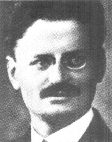 “The dictatorship of the proletariat which has risen to power as the leader of the democratic revolution is inevitably and, very quickly confronted with tasks, the fulfillment of which is bound up with deep inroads into the rights of bourgeois property.” “The dictatorship of the proletariat which has risen to power as the leader of the democratic revolution is inevitably and, very quickly confronted with tasks, the fulfillment of which is bound up with deep inroads into the rights of bourgeois property.”
Natalia Sedova Trotsky (1882-1962) < 5
Russian Revolutionary. Worked with Lenin and Trotsky on pre-revolutionary Bolshevik newspaper Iskra. Publicly split with Fourth International in 1951. Wife of Leon Trotsky.
[Biography]
Leon Kamenev (1883-1936) < 5
Old Bolshevik and founding member of Russian Social Democratic Labour Party. First chariman of Central Committee and a founding member of the politburo. First supported Stalin, then joined Trotsky to try to remove him. Imprisoned and placed on trial for alleged assassination plot against Stalin. Executed by the Soviet government.
[Biography]
Gregory Zinoviev (1883-1936) < 5
Bolshevik. With Kamenev, opposed the plans for a revolution. Allied with Stalin and Kamenev against Trotskyism. Later, allied with Trotsky against Stalin. Wrote about the history of the party. Executed during the Moscow Trials.
[Biography]
Alexander Shliapnikov (1885-1937) < 5
Old Bolsheik, a member of the Central Committee during the October Revolution and member of the “Workers Opposition” after the Revolution. Executed by the Soviet government.
[Biography]
Karl Radek (1885-1939) < 5
Old Bolshevik, active in the Communist International in Europe. Died in prison.
[Biography]
Grigory Sokolnikov (1880-1936) < 5
Old Bolshevik, Brest-Litovsk negotiator, Ambassador to England, and People's Commissar for Finance.
[Biography]
Nikolai Bukharin (1888-1938) 10+
Bolshevik Revolutionary. Editor of Pravda (1928-29). Joined Stalin against Trotsky, then led the Right Opposition against Stalin. A theoretical leader of the party, focused heavily on economics, and wrote on market socialism. Executed after the Moscow Trials.
[Biography]
Evgenii Preobrazhensky (1898-1937) <5
Young Bolshevik, Member of the Left Opposition. Executed after the Moscow Trials.
[Biography] |
| See Also: Josef Stalin, Alexander Lozovsky, Vyacheslav Molotov. |
 In 1919, the Bolsheviks held a conference attended by revolutionaries fom every corner of the world, and established the Communist International (Comintern); soon there were Communist Parties in every country, drawing the most militant workers to the Bolsheviks. In 1919, the Bolsheviks held a conference attended by revolutionaries fom every corner of the world, and established the Communist International (Comintern); soon there were Communist Parties in every country, drawing the most militant workers to the Bolsheviks.
|
Charles Rappoport (1865-1941) < 5
Russian revolutionary, joined French CP as an exile.
[Biography]
Wilhelm Pieck (1876-1960) <5
Carpenter, Spartacist and founder of the German CP; later a supporter of Stalin, in 1949 appointed President of the GDR.
Alexander Lozovsky (1878-1952) 5+
Old Bolshevik, Ukrainian Jewish worker, leader of the Red International of Trade Unions.
[Biography]
John MacLean (1879-1923) 40+
Scottish schoolteacher and Marxist educator. His evening-classes produced many of the activists who became instrumental in the Clyde revolts during and after WWI. Soviet Consul to Scotland.
[Biography]
Henri Wallon (1879-1962) < 5
French Psychologist who elaborated a systematic Marxist psychology.
[Biography]
Pierre Monatte (1881-1960) < 5
French communist. Founding member of PCF, expelled in 1924, revolutionary syndicalist.
[Biography]
Max Eastman (1883-1969) < 5
American socialist who became a prominent support of Trotsky but later an anti-communist.
[Biography]
Louise Bryant (1885-1936) < 5
American Revolutionary, supporter of the Soviet government. Historian of the revolution. Tireless advocate to stop U.S. invasion of Soviet Russia. Wife of John Reed.
[Biography]
Bela Kun (1886-1937) 10+
Hungarian Communist, activist in the Comintern.
[Biography]
Paul Levi (1886-1930) lt;5
German Communist, activist in the Comintern.
[Biography]
Guido Baracchi (1887-1975) <5
A founder of the Australian CP, member of ECCI, joined Trotskyists 1939.
[Biography]
M N Roy (1887-1954) 20+ 
Indian Communist and key leader of the Comintern, later a radical humanist.
[Biography]
Wm. F. Dunne (1887-1953) 5+
Miner, founding member of the CPUSA, expelled after returning from War service.
Max Bedacht (1883-1972) 5+
German born American socialist, impossiblist, founding member of the CPUSA.
Evelyn Roy (1892-1970) 5+
American Communist who helped her husband, M.N. Roy, found Communist Parties in Mexico and India.
[Biography] | John Reed (1887-1920) 20+
American Revolutionary, supporter of the Soviet government. Historian of the revolution. Tireless advocate to stop U.S. invasion of Soviet Russia. Husband of Louise Bryant.
[Biography]
Louis Fraina (Corey) (1892-1953) < 5
American socialist, supporter of Russian Revolution, later expelled from the Comintern and wrote on economics.
August Thalheimer (1890-1960) 5+
Prominent German theorist. Expelled from the Communist Party for "right-wing deviation" in 1928 as main theorist for the Brandlerites. Particularly occupied with analyzing the actual class struggle of his time on independent Marxist grounds.
[Biography]
Victor Serge (1890-1947) 10+
Originally an anarchist, later joined the Russian Communist Party. As a Comintern representative in Germany he helped prepare the aborted insurrection in 1923. Also joined the Left Opposition in 1923, expelled from the party in 1928 and briefly imprisoned. Exiled in 1933.
[Biography]
Antonio Gramsci (1891-1937) 50+ 
Helped create the Italian Communist Party. Arrested in 1926 for his revolutionary activities and sentenced by a fascist court to 20 years imprisonment. Theorized key concepts such as hegemony, base and superstructure, organic intellectuals, and war of position.
[Biography]
Josip Broz Tito (1892-1980) 5+
Yugoslav communist, participated in the October Revolution and built a partisan army during World War Two which won national liberation for Yugoslavia and united the country. Broke with Stalin over the Post-War settlement and took an independent line.
[Biography]
Andreu Nin (1892-1937) <5
Founder of Communist Party and in 1935 of the POUM in Spain.
[Biography]
José Carlos Mariátegui (1894-1930) 5+
Peruvian Professor. Self-educated. Historian of European Marxism and movements in South America.
[Biography] 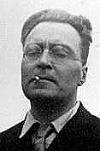 “1919: Horses dying from hunger in the roadway, pedestrians wan and inflated, scurvy, typhus, cold, hunger – treason – expectation. Soviets in Bavaria, Soviets in Hungary, the Internationale sung by two-thirds of Europe.” “1919: Horses dying from hunger in the roadway, pedestrians wan and inflated, scurvy, typhus, cold, hunger – treason – expectation. Soviets in Bavaria, Soviets in Hungary, the Internationale sung by two-thirds of Europe.”
[Victor Serge]
Henk Sneevliet (1883-1942) < 5
Dutch communist, early organiser for the Comintern, foundihng member of Communist Party in Indonesia.
[Biography]
Tan Malaka (1897-1949) 15+
Indonesian Communist, briefly became the Chairman of Indonesian Communist Party in 1921 before being exiled by the Dutch for the next 21 years. A prominent figure in the Indonesian national liberation movement and workers movement.
[Biography] |
| See Also: James Cannon, Karl Korsch, Georg Lukács, Sylvia Pankhurst.
|
Josef Stalin  (1879-1953) 800+ (1879-1953) 800+
General Secretary of Soviet Communist Party from 1917 till his death in 1953. Responsible for the murder of the entire Bolshevik leadership and the consolidation of bureaucratic rule in the USSR.
[Biography]
Otto Ville Kuusinen (1881-1964) < 5
Finnish Communist and Comintern leader under Stalin.
Georgi Dimitrov (1882-1949) 20+
Long-standing leader of Bulgarian C.P.
[Biography]
Vyacheslav Molotov (1890-1986)
Soviet leader who succeeded Stalin.
[Biography]
Nikita Khrushchev (1894-1971) 5+
Leader of Soviet Union who denounced Stalin in 1956 and tried to reform Soviet society.
[Biography]
Dmitry Manuilsky (1883–1959) < 5
Functionary in the Comintern and foreign service.
Lavrenti Beria (1899-1953) < 5
Close associate of Stalin, leader of Secret police 1938 till Stalin’s death.
[Biography]
Georgy Malenkov (1902-1988) < 5
Soviet politician, succeeded Stalin as Chairman of the Council of People’s Commissars of the USSR from 1953–1955.
Nikolai Bulganin (1895-1975) < 5
Soviet politician and minister in the Red Army. Succeeded Malenkov as Chairman of the Council of People’s Commissars of the USSR from 1955–1958.
Mikhail Suslov (1902-1982) < 5
Soviet politician and member of the Central Committee of the Soviet Communist Party.
——
Maurice Thorez (1900-1964) 5+
Post World War Two leader of the French Communist Party.
[Biography]
Louis Aragon (1897-1982) < 5
French Communist Poet.
[Biography]
Georges Politzer (1903-1942) < 5
French Marxist philosopher.
[Biography]
Moissaye J. Olgin (1878-1939) 5+
A leader of the Jewish Bund, and later leading member of the CPUSA.
[Biography]
William Z. Foster (1881-1961) 10+
Trade unionist and leader of the Communist Party of the USA.
[Biography]
Enver Hoxha (1908-1985) 5+
Leader of Albanian CP, followed separate foreign policy, anti-Khrushchev, anti-Mao and pro-Stalin.
[Biography]
|  “The final victory of socialism in the first country to emancipate itself is impossible without the combined efforts of the proletarians of several countries, and the unfolding of the world revolution will be the more rapid and thorough, the more effective the assistance rendered by the first socialist country to the workers and laboring masses of all other countries.”
British Communist Party
The CPGB History Archive includes a number of writers who were members of the Communist Party of Great Britain, including R. Page Arnot, Thomas Bell, Emile Burns, J. R. Campbell, Helen Crawfurd, Clemens Dutt, Ralph Fox, Will Gallacher, John Gollan, Wal Hannington, Arthur Horner, Albert Inkpin, T. A. Jackson, James Klugmann, J. T. Walton Newbold, Arthur MacManus, William Paul, Marjorie Pollitt, Andrew Rothstein, Theodor Rothstein, William Rust, Shapurji Saklatvala, Beth Turner, Ellen Wilkinson, and others as well as fellow-travellers such as Hewlett Johnson.
J. T. Murphy (1888-1965) 120+
Founding member of the CPGB and noted figure in Comintern and RILU matters who moved the resolution expelling Trotsky from the Comintern in 1927.
[Biography]
Harry Pollitt (1890-1960)
General Secretary of CPGB from 1929 till 1956, apart from 1940 when he opposed Stalin-Hitler Pact.
[Biography]
R. Palme Dutt (1896-1974)
Member of the Independent Labour Party before joining the Communist Party in 1920, Dutt was a member of the Executive Committee of the CPGB from 1923 until 1965.
[Biography]
J. D. Bernal (1901-1971) 15+
Popularised Marxism. Wrote a 4 volume history of science from a Marxist perspective.
[Biography]
Christopher Caudwell (1907-1937) 5+
English philosopher and writer, won to Marxism in the 1930s and died fighting for the Republican cause in Spain in 1937. Wrote classic Marxist analyses of literature and art.
[Biography]
Christopher Hill (1912-2003) < 5
English Marxist historian.
[Biography]
Wilfred Burchett (1891-1973)
Australian journalist documented US imperialist crimes, expecially in S.E.Asia; Australian government removed his Australian citizenship.
Pietro Secchia (1901-1977)
Popular Italian communist, on the left of the PCI and a historian.
[Biography]
Tim Buck (1891-1973)
A leader of the Canadian Communist Party, trade unionist, and agitator, especially among the unemployed during the Depression; loyal supporter of the Soviet line.
[Biography]
Fred Rose (1907-1983)
Canadian trade unionist, Communist and Member of Parliament.
[Biography]
—————
Bill Bland (1916-2001)
New Zealand-born communist, supporter of Enver Hoxha in Britain.
[Biography]
|
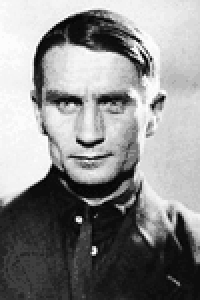 Soviet Philosophers and ScientistsWriters – scientists, philosophers, teachers – in the Soviet Union were obliged to develop their ideas in terms of the official orthodox Marxist dogma. Most of these writers cannot properly be described as Marxists, but nevertheless their work has contributed in some way or another to our understanding of Marxism.
|
I. V. Michurin (1855-1935) Soviet scientist who carried out groundbreaking research in genetics.
[Biography]
N. A. Semashko (1874-1949)
Architect of Soviet Health System.
[Biography]
Vitaly Vygodsky (1928-1998)
Soviet political economist.
[Biography]
Alexander Spirkin | Anton Makarenko (1888-1939)
Soviet educationalist who promoted development of virtues of discipline and collectivism.
[Biography]
T. D. Lysenko (1898-1976)
Promoted theory of inheritance of acquired characteristics as the official Communist Party line in biology.
[Biography] |
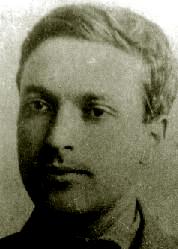 Soviet MarxismDespite the suppression of Trotskyism and the impossibility of open political discussion in Stalin's Soviet Union, a few Russians continued the development of Marxism in Psychology, Medicine, Law and the Sciences. This “non-political Marxism” only dared to show its political colours after Stalin's death.
|
Evgeny Pashukanis (1891-1937) 10+
Foremost exponent of the Marxist approach to Law.
[Biography]
Valentin Voloshinov (1895-1936) 5+
Soviet linguist, associate of Mickhail Bakhtin.
[Biography]
Evald Ilyenkov (1924-1979) 5+ 
Soviet philosopher. Charted the materialist development of Hegel's dialectics. Wrote extensively on dialectics, the Metaphysics of Positivism, and The Dialectics of the Abstract and Concrete in Marx's Capital.
[Biography]
V A Lektorsky (192?- ) < 5
Soviet psychologist who wrote on foundations of subjectivity.
A I Meshcheryakov (1923-1974) < 5
Soviet psychologist who developed education of deaf-blind children.
Feliks Mikhailov (1930-2006) < 5
Soviet philosopher who challenged simplistic ideas of subjectivity. | Lev Vygotsky (1896-1934) 10+ 
Soviet Psychologist who founded the Cultural Historical Activity Theory (CHAT) school of human development.
[Biography]
Alexander Luria (1902-1977) < 5
The creator of neuropsychology. Soviet Psychologist who made advances in cognitive psychology, the processes of learning and forgetting, and mental retardation. Charted the way in which damage to specific areas of the brain affect behavior.
[Biography]
Alexei Leont'ev (1904-1979) < 5
Soviet Psychologist who developed his own theory of activity which linked social context to development.
[Biography]
Daniil El'konin (1904-) < 5
Soviet Psychologist who developed cultural-historical activity theory in the field of childhood development. |
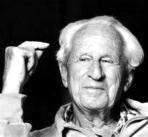 As it became clear that the world revolution had not spread beyond Soviet Russia, the Communist Parties still exercised great influence, particularly in the workers movement, but some Marxists turned to the unique problems of fighting capitalism in advanced capitalit countries where revolution was no longer on the immediate agenda. As it became clear that the world revolution had not spread beyond Soviet Russia, the Communist Parties still exercised great influence, particularly in the workers movement, but some Marxists turned to the unique problems of fighting capitalism in advanced capitalit countries where revolution was no longer on the immediate agenda.
|
Georg Lukács (1885-1971) 10+ 
Hungarian philosopher, writer, and literary critic. Commissar for Culture and Education in Hungary's short-lived Socialist government (1919). Helped lead the Hungarian uprising of 1956 against Stalinist repression. Created Marxist theory of aesthetics that opposed political control of artists, defended humanism, elaborated alienation.
[Biography]
Roman Rosdolsky (1898-1967) <5
Polish Marxist political economist.
[Biography]
JBS Haldane (1892-1964) 10+
British geneticist, biometrician, physiologist, and popular advocate of science; “Fellow traveller” of the British CP.
Samezō Kuruma (1893-1982) 5+
Japanese Marxist economist who wrote on the history of political economy and Marx’s theory of crisis and money edited the 15-volume Marx-Lexikon zur Politischen Ökonomie.
[Biography]
Marxism in Japan.
Jules de Gaultier (1858-1942) <5
French philosopher.
[Biography]
Jean-Paul Sartre  (1905-1980) 10+ (1905-1980) 10+
Existentialist philosopher who played an important role in the non-Communist Party Left in post-World War Two France, existentialist, later attracted to Marxism.
[Biography]
Paul Nizan (1905-1940) < 5
French writer and Communist Party militant, friend of Jean-Paul Sartre; resigned CP afer Stalin’s pact with Hitler, killed near Dunkirk in 1940.
[Biography]
Louis Althusser (1918-1990) 10+ 
Criticised Marxism from the standpoint of Structuralism.
[Biography]
Lucien Sève (1926-) < 5
French philosopher, who has written on personality and ethics, member of CC of French Communist Party.
[Biography]
Guy Debord (1931-1994) < 5
Marxist of the 1960s generation who developed ideas about “the society of the spectacle.” Valued by the “Autonomists.”
[Biography]
Benny Lévy (1945-2003) < 5
French Marxist, variously Maoist and follower of Althusser, Trotskyist (Gauche Prolétarienne), Islamist and assistant to Jean-Paul Sartre before returning to the study of the Talmud.
[Biography] | Karl Korsch (1886-1961) 5+
German Left Communist who wrote one of the founding documents of “Western Marxism”, expelled from the Comintern. Became pessimistic about the prospects for socialism by the end of World War Two, but was later to become a supporter of Mao.
[Biography]
Henryk Grossman (1881-1950) < 5
Polish-Jewish Communist, Marxist Political economist.
Walter Benjamin (1892-1940) < 5
Critic of degeneration of art under capitalism
[Biography]
Max Horkheimer (1895-1973) 5+
Long-term leader of the Frankfurt Institute from 1930, theorised Fordist, mass-production society.
[Biography]
Leo Lowenthal (1900-1993) < 5
Philosopher who wrote on literary theory.
[Biography]
Erich Fromm (1900-1980) 5+
German-born U.S. psychoanalyst and social philosopher who explored the interaction between psychology and society. By applying Freudian principles to social problems, Fromm helped show the way to a psychologically balanced, “sane society.”
[Biography]
Theodor Adorno (1903-1969) < 5
Philosopher who studied the effects of mass culture and fascism on European society.
[Biography]
Herbert Marcuse  (1898-1979) 5+ (1898-1979) 5+
Last member of the original Frankfurt School, reached a broader audience in the 1960s with his critique of “consumer society” and the containment of opposition.
[Biography]
Jürgen Habermas (1929- ) < 5
Leader of second generation of the Frankfurt School, theorised the idea of “networks” as opposed to Party and class, and initiated study of procedural ethics.
[Biography] |

After the victory of Hitler in Germany, Leon Trotsky concluded that the Third International was dead for the purposes of revolution, and launched the Fourth International with his supporters in countries around the world. Trotskyism became an opposition force in the workers' movement everywhere.
|
James Cannon (1890-1974) 100+ 
American, IWW organiser, later helped create the US Communist Party. In the 1920s became a Trotskyst, and helped create the US Socialist Workers Party.
[Biography]
Pandelis Pouliopoulos (1900-1943) 10+
Greek Trotskyst. Lead mass movements of veterans and defended workers in court. Wrote extensively about Trotsky. Shot dead by fascists while in prison.
[Biography]
Chen Bilan (1901-1971) < 5
Early member of Chinese CP, a founder of Trotskyism in China.
Frank Glass (1901-1988) < 5
South African communist who travelled to China and wrote extensively on China as a Trotskyist.
Max Shachtman (1904-1972) 20+
American Communist Party, then helped create the American Trotskyist movement. Left the SWP and joined the Socialist Party.
[Biography]
James Burnham (1905-1987) 20+
American Trotskyist who broke with Trotsky with a concept of bureaucratic collectivism, later writing about the “managerial revolution.”
George Novack (1905-1992) 10+ 
American Trotskyist and writer on Marxist philosophy.
[Biography]
Felix Morrow (1906-1988) 5+
American Trotskyist, wrote a classic eye-witness history of the Spanish Revolution. After the WWII, understood that Capitalism would recover and dominate the world, and that Socialism had a long struggle ahead.
[Biography]
Joseph Hansen (1910-1979) 10+
A leader of the US SWP 40s-60s, advocate for Cuban revolution.
Harry Braverman (1920-1976) 10+
US Trotskyist in 1930s, editor of Monthly Review Press from 1967.
[Biography]
Walter Held (1910-1941) 5+
German Jew expelled from the Communist Party for supporting Leon Trotsky, fled to France and later Norway he was eventually assassinated by a Stalinist agent.
[Biography]
Pierre Frank (1906-1984) 10+
French Trotskyist, a founder of the International Left Opposition in 1928, later a leader of the LCR.
[Biography]
Michel Pablo (1911-1996) 5+
International Secretary of Fourth International after WWII. Minister in Ben Bella's Socialist government of Algeria. Developed theory of "centuries of deformed workers states".
[Biography]
David Korner (Barta) (1914-1976)5+
Romanian trotskyist, active in France from 1936. In 1939, he broke with the IVth International groupings in France and founded the "Groupe Communiste (IVéme Internationale), latter renamed "Union Communiste (Trotskyste)". Today's "Lutte Ouvriére" group claims to stand in the continuity of Barta's UC(T).
[Biography]
Hal Draper (1914-1990) 20+ 
American Marxist, journalist and labor activist. Founder of the Socialist Workers Party & Fourth International in 1938, later founded the International Socialist party. Stopped associating with Trotskyism after the 1960s.
[Biography] | Ted Grant (1913-2006) 100+ 
South African-born British Trotskyist, a founder and long-term leader in the “Militant Tendency” within the Labour Party until expelled from the Labour Party in 1983, and after.
[Biography]
Grandizo Munis (1912-1989) 10+
Spanish Trotskyist.
[Biography]
Pierre Broué (1926-2005) 5+
French Trotskyist leader and historian.
[Biography]
Abram Leon (1918-1944) < 5
Jewish socialist and Historian, became a leading Belgian Trotskyist during World War II.
[Biography]
Ernest Mandel (1923-1995) 100+ 
Belgian Trotskyist founder and leader of United Secretariat of the Fourth Intenrational, renowned as Marxist Economist.
[Biography]
Nahuel Moreno (1924-1987) < 5
Argentinian Trotskyist. Leader of the Liga Internacional de Trabajadores (LIT), and of Movement for Socialism (MAS) in Argentina, among the largest revolutionary currents in Latin America which remained oriented to the urban working class after the Cuban Revolution, and opposed guerillaism.
 “Just as it became necessary to discard the slogan of the ‘democratic dictatorship of the proletariat and peasantry’ after the Bolshevik Party had existed for 14 years, so has it now become necessary to renounce the theory of Russia as a degenerated workers’ state.” “Just as it became necessary to discard the slogan of the ‘democratic dictatorship of the proletariat and peasantry’ after the Bolshevik Party had existed for 14 years, so has it now become necessary to renounce the theory of Russia as a degenerated workers’ state.”
Tony Cliff (1917-2000) 50+ 
Palestinian Jewish Trotskyist, developed critique of Stalinist Russia as a form of "bureaucratic state capitalism", laid the basis of the theory of 'deflected' permanent revolution and the 'permanent' arms economy, founder of International Socialist Tendency.
[Biography]
Duncan Hallas (1925-2002) 40+
British Trotskyist, founder member of the International Socialist Tendency and leader of the British Socialist Workers Party.
[Biography]
Michael Kidron (1930-2003) 10+
A leading theoretician of the British Socialist Review Group and its successor, the International Socialists; also an editor of several publications including Pluto Press.
Jim Higgins (1930-2002) 10+
British postal worker and trade unionist, a founder of the ISO.
[Biography]
Peter Sedgwick (1934-1983) 50+
Theorist of the British ISO in the 1950s, translator and editor of Victor Serge.
[Biography]
Paul Foot (1937-2004) 100+
Trotskyist and prominent investigative journalist in Britain, member of International Socialists.
Chris Harman (1942-2009) 10+
British activist, journalist and historian.
[Biography]
David Widgery (1947-1992) 10+
British cultural critic, anti-fascist agitator and Marxist writer.
[Biography]
————
Geoff Pilling (1940-1997) < 5
British Trotskyist, economist. |
| See also: Leon Trotsky, Hal Draper, Evelyn Reed and others. |
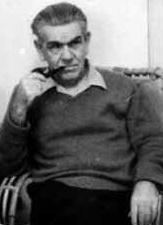
A number of Marxists, especially in Europe and the US, not only rejected Stalinism, but rejected the whole project of building socialism through state power. These were Marxists, not Anarchists, and they remain a force to this day.
|
Herman Gorter (1864-1927) < 5
Dutch socialist and poet, opposed WWI, became an advocate of ultra-left within Comintern. Expelled from Communist Party.
[Biography]
Anton Pannekoek (1873-1960) 30+
Dutch astonomer. Helped form a Marxist party in the Netherlands. Member of the German Social Democratic party.
[Biography]
Cajo Brendel (1915-2007) < 5
Dutch Left Communist. A central figure in the Council Communists movement (second-generation) and a Pannekoek sympathiser.
Otto Rühle (1874-1943) 5+
German Left Communist who voted with Karl Liebknecht against the war credits and was a founding member of the German Communist Party.
[Biography]
Eugene Lanti (1879-1947) < 5
French supporter of Esperanto and anti-nationalism.
[Biography]
John Keracher (1880-1958) < 5
Scottish American socialist educator, founding member of the CPUSA, and later the Proletarian Party. Keracher was also a journalist and agitator.
[Biography]
| Sylvia Pankhurst (1882-1960) < 5
British Left-Communist and Suffragette.
[Biography]
Amadeo Bordiga (1889-1970) 5+
Italian Communist, was expelled from Comintern as an ultra-left, later leading an independent Marxist Party in Italy.
[Biography]
Jacques Camatte ( ) 5+
French political economist, follower of Bordiga.
Marceau Pivert (1895-1958) < 5
French communist, trade unionist and anti-militarist.
[Biography]
Paul Mattick  (1903-1942) 60+ (1903-1942) 60+
German Left Communist, later lived in the U.S.. Main exponent of “Council Communism” and opponent of idea of Revolution being led by a political party.
[Biography]
Arrigo Cervetto (1927-1995) < 5
Italian Marxist, active in trade unions after WW2, built Lotta Comunista, an independent communist current in Italy.
[Biography]
|
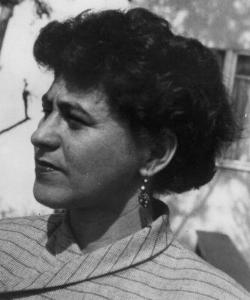
Although Marxist Humanism first appeared as a break-away form orthodox Trotskyism, in the 1960s many intellectuals in Eastern Europe and in the Communist Parties in Britain and the US, embraced a Humanist Marxism, emphasising human agency, rather than structural determinism and “iron laws of history” and so on.
|
CLR James  (1901-1989) 30+ (1901-1989) 30+
West Indian, Afro Caribbean. Lucid dialectician, historian, novelist, & playwright. Stressed the importance of non-white workers to the revolutionary movement, foresaw the civil rights movement decades before it got underway.
[Biography]
Raya Dunayevskaya (1910-1987) 30+
American Russian Trotskyst, Humanist. Secretary to Trotsky, translated many Marx, Engels and Lenin. Critiqued Lenin's theory of the Party being the vanguard.
[Biography]
Martin Glaberman (1918-2001) 20+
American autoworker and life-long supporter of Raya Dunayevskaya and C L R James.
[Biography]
Maurice Brinton (1923-2005) 15+
British libertarian socialist, prominent neurologist and the intellectual leader of Solidarity (U.K.).

“It is with this problem of agency in mind that I have been studying, for several years now, the cultural apparatus, the intellectuals — as a possible, immediate, radical agency of change.” [C. Wright Mills, 1962]
C. Wright Mills (1916-1962) < 5
American Communist, initiated the “New Left” in the U.S.
[Biography]
Z. A. Jordan (d. 1978) < 5
Polish Marxist Philosopher. | Cornelius Castoriadis (1922-1997) < 5
Greek philosopher, economist and psychoanalyst. Co-founder of the Socialisme ou Barbarie group.
Maximilien Rubel (1905-1996) < 5
French sociologist, Marxist humanist and with T.B. Bottomore, a prolific publisher and translator.
[Biography]
Sebastiano Timpanaro (1923-2000) < 5
Italian philologist, philosopher and Marxist.
[Biography]
E P Thompson (1924-1993) < 5
English Marxist historian and humanist.
[Biography]
Joe McCarney (1941-2007) < 5
English Hegelian-Marxist.
[Biography]
Eugene Kamenka (1928-1995) < 5
Australian Marxist, elaborated ethical foundations of Marxism. Rudi Supek (1913-1993) < 5
Croatian Marxist sociologist, Marxist Humanist, in Praxis group.
[Biography]
Gajo Petrović (1927-1993) < 5
Marxist Humanist, one of the main theorists in the Praxis Group and long-time editor of the journal Praxis.
[Biography]
Mihailo Marković (1927-) < 5
Serbian Marxist philosopher, one of the first and fiercest critics of the Stalinist philosophical theses in Yugoslavia, led return to study of Marx’s critical method in the mid-1960s.
[Biography] |
| |
Deng Xiaoping (1904-1997)
Former longstanding leader of the Chinese Communist Party; purged as a “capitalist roader” during the Cultural Revolution, but returned to power after Mao's death and led the gradual return of China to capitalism.
[Biography]
Branko Pribicevic (1928-2003) < 5
Political scientist, member of the Central Committee of the League of Communists of Serbia.
[Biography] | Ota Šik (1919-2004)
Czech dissident who became Deputy Prime Minister during the “Prague Spring” advocating a “Third Way” between capitalism and communism; in exile, became more of a social democrat of the Western variety.
[Biography]
See also Eurocommunism by Manuel Azcárate. |
—— New Worker / Communist Currents —— |
Mansoor Hekmat (1951-2002) < 5
Iranian Marxist. Conducted party building for the workers' movements in Iran and Iraq, specifically the Worker-Communist Party of Iran.
| Filemon Lagman (1953-2001) < 5
Phillipino Communist. Led the split in the Communist Party of the Philippines in 1991 over strategy of guerilla warfare. Advocated the orientation to the workers movement, combining parliamentary and extra-parliamentary means of struggle.
|
| |
Salvadore Allende (1908-1973)
Leader of the Chilean Socialist Party and President of Chile in 1973, when he was overthrown by a US-organised coup.
[Biography]
| |
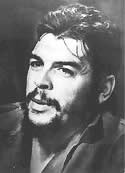
Some Marxists, in countries where open political debate was impossible, turned instead to military struggle as a form of political organisation, retiring to the countryside and basing themselves on the peasantry, rather than the urban working class.
|
Che Guevara (1928-1967) 10+ 
International Revolutionary. Helped create and maintain the Cuban Revolution. Creatively tried to establish socialism in Cuba, worked tirelessly to create revolutions throughout Africa and South America. Created the guerilla foco theory – building a revolutionary movement through militant resistance instead of party building.
[Biography]
“The road is long and, in part, unknown. We recognize our limitations. We will make the human being of the 21st century – we, ourselves.” [Che Guevara] | Carlos Marighella (1911-1969) < 5
A Brazillian revolutionary who led the National Liberation Action (ALN). His tactics inspired the Italian Red Brigades, the German Red Army Faction. Expelled from the Brazilian Communist Party for “pro-Cuban” sympathy. Executed by police.
Schafik Jorge Handal (1930-2006) < 5
General Secretary of the Communist Party of El Salvador, and guerrilla commander in the Farabundo Marti National Liberation Front (FMLN) in the 1980s.
[Biography]
|
 In the early 1960s, divisions opened up within the Comintern, with a current sympathetic to the Mao Zedong, as opposed to the Soviet leader Khrushchev, developing a distinct philosophical and political line, emphasising the role of the peasantry. In the early 1960s, divisions opened up within the Comintern, with a current sympathetic to the Mao Zedong, as opposed to the Soviet leader Khrushchev, developing a distinct philosophical and political line, emphasising the role of the peasantry.
|
Mao Zedong  (1893-1976) 100+ (1893-1976) 100+
Became leader of the Chinese Communist Party during the Long March in 1937, and led China to its Revolution in 1949 and remained its supreme leader until his death in 1976.
[Biography]
Lin Biao (1907-1971)
Firm supporter of Mao during the Cultural Revolution, leader of the Red Army.
[Biography]
Zhou Enlai (1898-1976) 10+
Most respected of the old generation of leaders of the Chinese Communist Party.
[Biography]
Peng Zhen (1902-1997)
Longstanding leader of the Chinese Communist Party; denounced during the Cultural Revolution, but survived and returned to leadership, as one who opposed restoration of the market.
[Biography]
 “The revolutionary war is a war of the masses; only mobilizing the masses and relying on them can wage it.” “The revolutionary war is a war of the masses; only mobilizing the masses and relying on them can wage it.”
Shibdas Ghosh (1923-1976) 5+
A founder of the Marxist-Leninist Socialist Unity Centre of India.
| Zhu De (1886-1976)
Longstanding leader of the CCP, denounced during the Cultural Revolution but later rehabilitated.
[Biography]
Li Lisan (1899-1967) < 5
Early leader of Chinese CP, regarded as ultra-leftist, denounced during Cultural Revolution, and committed suicide.
[Biography]
Liu Shaoqi (1902-1969) 10+
Longstanding leader of the Chinese Communist Party who was denounced during the Cultural Revolution as a “capitaist roader” and died in prison.
[Biography]
Zhang Chunqiao (1917-2005)
Part of the core leadership of China's Cultural Revolution. Worked closely with Mao's wife, Jiang Qing.
Hua Guofeng (1920- )
Led China after the Cultural Revolution after out-manoeuvering “Gang of Four” in a power struggle later in 1976. Deng Xiaoping's policies of reform began to take shape during Hua's tenure, and by 1980, leadership had shifted to Deng. Hua remains a member of the CC.
[Biography]
NaxalbariCharu Mazumdar (1918-1972) 20+
A founder of the pro-Chinese Communist Party of India (Marxist-Leninist), died in police custody.
[Biography]
Vinod Mishra (1947-1998) 10+
Longstanding leader of the Communist Party of India (Marxist-Leninist) Liberation.
[Biography]
|
 Particularly in the decades after the end of World War Two, communists were in the leadership of national liberation struggles, the leaders of these struggles developed a distinct approach to socialist theory. Particularly in the decades after the end of World War Two, communists were in the leadership of national liberation struggles, the leaders of these struggles developed a distinct approach to socialist theory.
|
Ho Chi Minh (1890-1969) 30+
Longstanding leader of the Vietnamese national liberation movement; set-up a guerilla base in the countryside in 1944, going on to defeat the French in 1954, but dying before final victory over the US invasion in 1975.
[Biography]
Pham Van Dong (1906-2000) < 5
Leader of the Vietnamee Army in the wars against both the French colonial forces and the US invaders. Foremost theorist of protracted warfare.
[Biography]
Le Duan (1908-1986) 5+
Led Communist forces in South Vietnam after French withdrawal in 1954 and was First Secretary of North Vietnam Communist Party from 1959. After Ho Chi Minh’s death in 1969, became Party leader.
[Biography]
Kim Il Sung (1912-1994) 5+
Founding head of state of Democratic People's Republic of Korea.
Bhagat Singh (1907-1931) 10+
Leader of the militant and socialist wing of the Independence Movement in India; hanged by the British in 1931.
[Biography]
Marxism and Anti-Imperialism in India.
George Padmore (1902-1959) 30+ 
West Indian, CPUSA and Comintern 1927-1935, became leading advocate of Pan-Africanism.
[Biography]
Harry Haywood (1898-1985) <5
Leader of CPUSA and Comintern. Supported Mao and was expelled from the CPUSA.
[Biography]
| Lu Xun (1881-1936) 20+
One of modern China’s most prominent and influential writers. His work frequently promoted radical change through criticism of antiquated cultural values and repressive social customs.
[Biography]
Messali Hadj (1898-1974) 5+
Algerian communist and founder of the modern Algerian nationalist movement; supporter of the Russian Revolution.
[Biography] 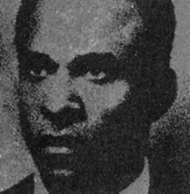
“A national culture under colonial domination is a contested culture whose destruction is sought in systematic fashion. It very quickly becomes a culture condemned to secrecy.”
Frantz Fanon (1925-1961) < 5
West Indian-born, French/Algerian doctor and intellectual whose works addressed the problems of developing national consciousness in the oppressed people, an inspiration for the US Civil Rights movement as much as in Black Africa.
[Biography]
Paulo Friere (1921-1997) < 5
Brazilian educator, member of the Workers' Party.
Fidel Castro  (1927- ) 10+ (1927- ) 10+
Leader of the Cuban Revolution and President of Cuban Republic.
[Biography]
Cuban History Archive. |
 The struggle against colonialism in Africa, to create independent socialist states, brought forward several generations of heoric fighters, who contributed to the development of Marxist ideas. The struggle against colonialism in Africa, to create independent socialist states, brought forward several generations of heoric fighters, who contributed to the development of Marxist ideas.
|
Kwame Nkrumah (1909-1972) < 5
Nkrumah was the force behind the movement for independence of Ghana, then British West Africa, first president of independent Ghana in 1957. His 1965 “Neocolonialism, the last stage of imperialism,” introduced the concept of “neocolonialism.”
[Biography]
Govan Mbeki (1910-2001) < 5
Life-long activist for the African National Congress and the South African Communist Party.
[Biography]
Brian Bunting (1920- ) < 5
Journalist, Cental Committee member of the South African CP, ‘natives representative’ in Parliament before being banned, and fleeing to Britain.
[Biography]
Joe Slovo (1926-1995) < 5
Leader of the South African Communist Party in 1991 till his death in 1995, leading SACP after the collapse of the USSR, to the final overthrow of apartheid.
[Biography]
| Baruch Hirson (1921-1999) < 5
South African Trotskyist. Organiser for Workers International League, participated in the armed struggle, imprisoned, but went into exile in 1973.
[Biography]
Julius Nyerere (1922-1999) < 5
Pan-Africanist, socialist and leader of Tanzanian independence struggle and its first President.
[Biography]
Amilcar Cabral (1924-1973) < 5
Lead of independence struggle in Guinea-Bissau, assassinated by Portuguese agents.
[Biography]
Patrice Lumumba (1925-1961) < 5
Leader of independence movement in the Congo, executed by Belgian colonial police, despite U.N. calls for his release.
[Biography]
|
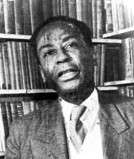 From the 18th century up to the present people of colour have resisted oppression by white capitalist powers and have developed a distinct current of revolutionary socialist thinking. From the 18th century up to the present people of colour have resisted oppression by white capitalist powers and have developed a distinct current of revolutionary socialist thinking.
|
Toussaint Louverture (1743-1803) 10+
The “Black Jacobin” who led a slave rebellion in Haiti in 1800 and created the first Black Republic, inspired by the French Revolution.
[Biography]
 “I don't believe in fighting today in any one front, but on all fronts. In fact I'm a Black Nationalist Freedom Fighter. Islam is my religion, but I believe my religion is my personal buisness.... The economic philosophy of Black Nationalism only means that we should own and operate and control the economy of our community.” “I don't believe in fighting today in any one front, but on all fronts. In fact I'm a Black Nationalist Freedom Fighter. Islam is my religion, but I believe my religion is my personal buisness.... The economic philosophy of Black Nationalism only means that we should own and operate and control the economy of our community.”
| John Brown (1800-1859) 5+
American slave-abolitionist who aimed to build an emancipation army, hanged after a shoot-out with Robert E. Lee.
Malcolm X  (1925-1965) 5+ (audio) (1925-1965) 5+ (audio)
US Black Muslim leader, assassinated in 1965.
[Biography]
Black Panther Party
(1966-1998)
See Also: George Padmore, C.L.R. James, Frantz Fanon and Angela Davis. |
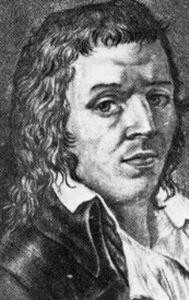 The leaders of the French Revolution were the first to develop modern social theory and laid the basis for the modern socialism. Rousseau traced the origins of inequality to private property, and Babeuf is credited with being the first Communist. The socialist ideas from the French Revolution are one of the sources of Marxism. The leaders of the French Revolution were the first to develop modern social theory and laid the basis for the modern socialism. Rousseau traced the origins of inequality to private property, and Babeuf is credited with being the first Communist. The socialist ideas from the French Revolution are one of the sources of Marxism.
|
Julien La Mettrie (1709-1751) 5+
Militant atheist.
[Biography]
Jean-Jacques Rousseau (1712-1778)
It has been said that the French Revolution, put Rousseau's philosophy into practice, in particular his idea of the Social Contract. Although he died 20 years before the Revolution, he was its principle theorist.
[Biography]
Jean-Paul Marat (1743-1793) 10+
Leader of the left wing of the Revolution, inspired the execution of royalist prisoners which launched the second, radical phase of the Revolution; his murder set off the Great Terror.
[Biography]
Robespierre (1758-1794) 10+
Leader of the Jacobins and instigator of the Great Terror, Robespierre was the ultimate “moralist.” His overthrow marked the end of the radical phase of the Revolution.
[Biography] | Jacques Roux (17??-1794) 5+
Priest who became a leader of the popular democratic Enragés during the French Revolution. He was renowned for the foul and abusive language of his journalism.
[Biography]
Jacques Hébert (1757-1794) 5+
Leader of the extreme left-wing during the Revolution and spokesperson of the sans coulottes. Hébert initiated a planned economy before his overthrow, after which the Revolution lost the support of the poor.
Holbach (1723-1789) 5+
French materialist and atheistic philosopher.
[Biography]
Gracchus Babeuf  (1760-1797) 5+ (1760-1797) 5+
Rose to prominence in the twilight of the Revolution, convening a running public forum organising for more radical measures. He can be regarded as the first communist and an advocate of popular sovereignty and participatory democracy.
[Biography] |
Auguste Blanqui  (1805-1881) 20+ (1805-1881) 20+
Founder of the communist movement in the 1830s, he believed communism could be achieved by the dictatorship of a radical minority. He was immensely popular in France and elsewhere but spent most of his days in prison.
[Biography] 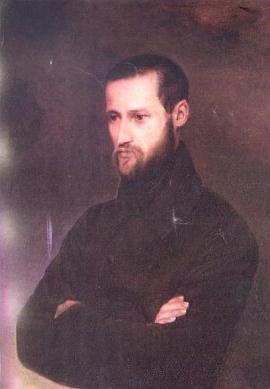 “It is my duty as a proletarian, deprived of all the rights of the city, to reject the competence of a court where only the privileged classes who are not my peers sit in judgment over me.” “It is my duty as a proletarian, deprived of all the rights of the city, to reject the competence of a court where only the privileged classes who are not my peers sit in judgment over me.”
Félix Pyat (1810-1889)
Veteran of the Revolution of 1848 and a leader of the left-wing of the Paris Commune.
[Biography]
General Boulanger (1837-1891) <5
Populist French military leader. | The Paris Commune
Jules Vallès (1832-1885) 5+
Agitator, editor of Le Cri du Peuple.
[Biography]
Henri Rochefort (1831-1913)
Journalist, deputy to Government of National Defence for Paris.
[Biography]
Louise Michel (1830-1905)
Nurse, soldier, hero of the Commune and labour organiser.
[Biography]
|
 Visions of a better society have been a concern of thinkers since ancient times, and a part of the critique of existing conditions. The speculations of the early 19th century Utopians are an important contribution to Marxism. Fourier and Owen in particular were much admired by Marx and Engels. Visions of a better society have been a concern of thinkers since ancient times, and a part of the critique of existing conditions. The speculations of the early 19th century Utopians are an important contribution to Marxism. Fourier and Owen in particular were much admired by Marx and Engels.
|
Thomas More (1478-1535)
Thomas More wrote Utopia in 1515, looking forward to a world of individual freedom and equality governed by Reason, at a time when such a vision was almost inconceivable.
[Biography]
James Harrington (1611-1677)
Common-Wealth of Oceana was based on universal land-ownership and was a militant republic dedicated to spreading its democratic system to the rest of the world. Cromwell banned it.
[Biography]
Morelly (17??-17??)
Little is known of Morelly; Code of Nature was an attempt to provide a systematic philosophical justification of his communist ideas.
[Biography]
Saint-Simon (1760-1825)
French Utopian socialist who took part in War of Independence of the United States; opposed Deism and promoted the study of Nature.
[Biography]
| Charles Fourier  (1772-1837) (1772-1837)
French Utopian socialist who criticised the bourgeois society established by the French Revolution. He promoted the role of environment and education in moulding personality.
[Biography]
Robert Owen  (1771-1851) (1771-1851)
Welsh industrialist and social reformer; formed a model industrial community at New Lanark, Scotland, and pioneered cooperative societies.
[Biography]
Étienne Cabet (1788-1856)
His followers, known as the Icarians, established ill-fated utopian communities in Illinois, Missouri, Iowa, and California.
[Biography]
————
Edward Bellamy (1850-1898)
American author, famous for his utopian novel set in the year 2000, Looking Backward, published in 1888.
[Biography]
|
 Anarchism is a political current that has existed in the working class movement from its beginning and was an important component of the First International, but parted company with Marxism in the late 19th century. Anarchism is a political current that has existed in the working class movement from its beginning and was an important component of the First International, but parted company with Marxism in the late 19th century.
|
Pierre-Joseph Proudhon  (1809-1865) 5+ (1809-1865) 5+
Founding theorist of anarchism, advocated cooperative society.
[Biography]
Petr Kropotkin (1842-1921) 10+
Leader of Russian Anarchism.
[Biography]
Ravachol (1859-1892)
Radical French anarchist.
[Biography]
Zo d’Axa (1864-1930) 5+
Radical French anarchist.
[Biography]
Georges Etiévant (1865-) <5
French anarchist.
[Biography]
Bernard Lazare (1865-1903) 5+
French anarchist and militant opponent of anti-Semitism.
[Biography]
Emile Henry (1872-1894) <5
Radical French anarchist.
[Biography]
Libertad (1872-1894) 5+
French individualist anarchist.
[Biography]
Georges Palante (1862-1925) 5+
French individualist anarchist.
[Biography] 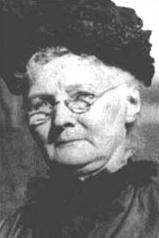
“The rank and file have let their servants become their masters and dictators. The workers have now to fight not alone their exploiters but likewise their own leaders, who often betray them, who sell them out.” [Mother Jones]
| Mikhail Bakunin  (1814-1876) 50+ (1814-1876) 50+
Russian nobleman who advocated revolutionary anarchism; participant in the First International winning leadership of a significant section of the International in the 1870s.
[Biography]
James Guillaume (1844-1916)
Biographer of Bakunin and theorist for anarcho-syndicalism.
[Biography]
Errico Malatesta (1853-1932) 20+
Leader of Italian anarchism, anarcho-syndicalist.
[Biography]
Nestor Makhno (1884-1934) 20+
Leader of anarchist forces during the Wars of Intervention after the Russian Revolution.
[Biography]
Emma Goldman  (1869-1940) 20+ (1869-1940) 20+
American anarchist and writer, deported to the Soviet Union, fought in Spanish Civil War.
[Biography]
Rudolf Rocker (1873-1958) 5+
German anarcho-syndicalist, worked in Jewish anarchist movement in London before going to New York.
[Biography]
Mother Jones (1830-1930)
Prolific and legendary American labor organiser.
[Biography]
Fredy Perlman (1934-1985) 5+
Czech anarchist writer and musician, emigrated to the U.S.
[Biography]
|
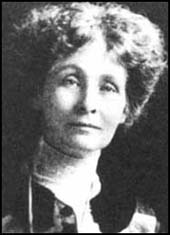 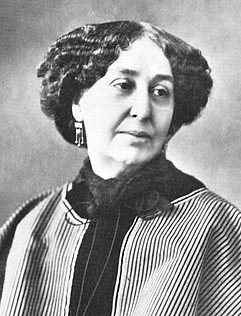 From the 18th century up to the present, women fighting against their oppression by patriarchal structures have developed political science, ethics and critical philosophy and contributed to the development of revolutionary theory. Many were Marxists. From the 18th century up to the present, women fighting against their oppression by patriarchal structures have developed political science, ethics and critical philosophy and contributed to the development of revolutionary theory. Many were Marxists.
|
Mary Wollstonecraft (1759-1797)
English radical who was the first woman to systematically enquire into the causes of women's oppression.
[Full Biography]
| Harriet Taylor (1856-1915)
Friend of John Stuart Mill, and her work was published under his name, one of the earliest arguments for the emancipation of women, in the tradition of classical liberalism.
[Full Biography]
|
Olive Schreiner (1855-1920)
South African-born, British socialist and novellist.
[Full Biography]
Lena Morrow Lewis (1862-1950)
American socialist and union organiser.
[Full Biography]
Vida Goldstein (1869-1949)
Australian suffragette, feminist and anti-militarist.
[Full Biography]
| 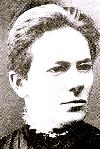
“There is a women’s question for the women of the proletariat, the bourgeoisie, the intelligentsia and the Upper Ten Thousand. It assumes a different form according to the class situation of each one of these strata.” [Clara Zetkin]
Mary Beard (1876-1958)
American socialist and historian.
[Full Biography]
|
| See Also: Sylvia Pankhurst, Clara Zetkin, Eleanor Marx, Dora Montefiore, Alexandra Kollontai. |
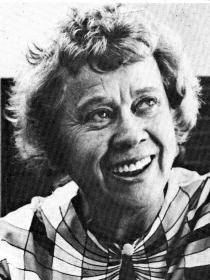 Evelyn Reed (1905-1979) 10+ Evelyn Reed (1905-1979) 10+ 
Member of the American Trotskyist movement, socialist feminist, was one of the first to challenge anthropological and other spurious justifications for patriarchy.
[Full Biography] | Simone de Beauvoir (1908-1986) 
Author of The Second Sex, the most significant review of approaches to the critique of women's role in history and modern society. De Beauvoir was an Existentialist.
[Full Biography]
|
Betty Friedan (1921-2006)
Psychologist, a student of Kurt Koffka, who criticised Freudian psychoanalysis for its rationalisation of sexist attitudes; exposed the deep crisis affecting American housewives, excluded from the workforce and confined to housework.
[Full Biography]
Clara Fraser (1923-1998)
Socialist-feminist, founder of Freedom Socialist Party in Seattle.
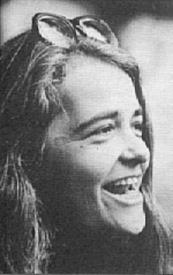 Kate Millett Kate Millett  (1934-) (1934-)
Radical Feminist, who argued for the expansion of the conceptions of historical materialism to include the processes of domestic labour and reproduction. May have coined the word “sexism.”
[Full Biography]
Germaine Greer (1939-)
Australian Radical Feminist
[Full Biography]
Juliet Mitchell (1940-)
New Zealand-born, British feminist who endeavoured to reconcile feminism with psychoanalysis.
[Full Biography]
Barbara Ehrenreich (1941-)
American Socialist feminist and journalist.
[Full Biography]
Sheila Rowbotham (1943-)
British socialist feminist; wrote for the Trotskyist ‘Black Dwarf’ before publishing ‘Women’s Liberation and the New Politics’ arguing that women were oppressed in cultural as well as economic terms. A pioneer of women’s history.
[Full Biography]
Angela Davis (1944-)
A member of the CPUSA for some time, Davis is a supporter of Cuba and an active campaigner for radical alternatives to prison. Her criticisms of the exclusive focus of the modern women's movement on the concerns of middle-class white women was influential.
[Full Biography] | Shulamith Firestone (1945-)
Radical feminist who argued that the concept of class should be expanded to encompass the notion of women as a sex-class, and thus utilise the ideas of Marxism and class struggle to understand the nature of women's oppression.
[Full Biography]
Marlene Dixon ( )
Socialist Feminist who argued both against the overreaction of feminists against socialism and the antipathy of socialists to feminism.
Dale Spender (1943- )
Historian who has contributed to uncovering the role of women in history, and analysed the historical development of the women's movement itself.
[Full Biography]
Lynn Beaton (1947-)
Australian Marxist and feminist, worked at the Working Women's Centre at the ACTU and researched the socialisation of women's labour.
Teresa Ebert ( )
Argues for a feminism based on historical materialism, against the postmodern feminism of people like Judith Butler, which she calls “ludic feminism.”
[Terea Ebert home page]
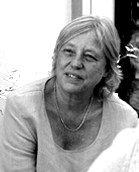 Linda Nicholson ( ) Linda Nicholson ( )
Historian who has contributed to uncovering the role of women in history, and analysed the historical development of the women's movement itself.
[Full Biography]
Drucilla Cornell ( )
American “Ethical feminist,” professor of political science, women's studies, and comparative literature at Rutgers University.
[Feminist Theory Website]
Laura Limpus ( ) |
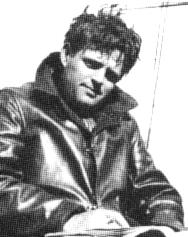 Socialist Populists and JournalistsSome writers have advocated the overthrow of capitalism or were outspoken supporters of the Soviet Union, but did not see themselves as Marxists, or may have combined reactionary “populist” rhetoric with calls for socialism. Some writers have contributed to the development of socialism simply by reporting on its struggles in their professional capacity as journalists, often eye-witnesses to revolutionary struggles, although not themselves participants.
|
Henry Noel Brailsford (1873-1958)
Left-wing British journalist who visited and publicsed the achievements of the Soviets.
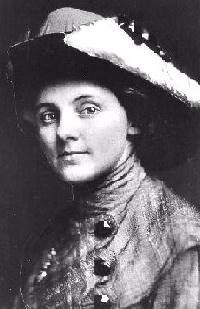 “Something new was being created. Something that had never been before in human history. I wanted to have a share in it, I wanted at least to understand it. Was it only the comradeship and joy of battle that always come to compensate for bitter times of struggle? Or was it really something new in the world!” “Something new was being created. Something that had never been before in human history. I wanted to have a share in it, I wanted at least to understand it. Was it only the comradeship and joy of battle that always come to compensate for bitter times of struggle? Or was it really something new in the world!”
Mary Heaton Vorse (1874-1966)
American radical journalist of the 1920s and 1930s.
[Biography]
Jack London (1876-1916)
American novelist, and populist socialist.
[Biography]
Helen Keller (1880-1968) 5+
Keller was deaf and blind but became renowned for her abilities. She was a firm supporter of the Russian Revolution and the IWW.
[Biography]
Athur Ransome (1884-1967)
British journalist and writer who visited the Soviet Union after the Bolshevik revolution.
William Chamberlin (1897-1969)
Journalist for the Christian Science Monitor, who visited the Soviet Union after the Revolution; provided information to US intelligence.
[Biography] | Anna Louise Strong (1885-1970) 5+
American Progressive journalist who reported on revolutions from Russia to Spain to China, a unique source of sympathetic views for American workers.
[Biography]
Mark Starr (1894-1985)
British labour educator, historian and proponent of Esperanto. Joined the Labour Party after a time in the CPGB.
[Biography]
Paul Robeson (1898-1976)
African-American Marxist and world-renowned singer and civil rights and anticolonialist fighter.
[Biography]
James T. Farrell (1902-1979)
Irish-American novelist, at one time a Trotskyist.
[Biography]
George Orwell (1903-1950)
British dystopian novelist, fought with Republicans in Spain, became anti-Stalinist, worked with the I.L.P.
Alice Field (1905-1960)
Sociologist who studied the benefits to families and children of the policies of the Soviet Union towards women.
[Biography]
Harold Isaacs (1910-1986)
American journalist who witnessed and chronicled the “Tragedy of the Chinese Revolution.”
Peter Fryer (1927-2006)
Correspondent of the British CP who witnessed the “Hungarian Tragedy” in 1956. |
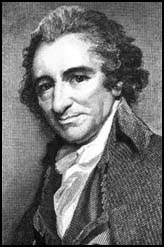 The history of political science is inseparable from the art of war and the problems of philosophy, and there is a long history to discussion of the problems of modern political theory. These writers are the pioneers of political science and revolutionary theory. The history of political science is inseparable from the art of war and the problems of philosophy, and there is a long history to discussion of the problems of modern political theory. These writers are the pioneers of political science and revolutionary theory.
|
Sun-Tzu (c 420 BCE)
Ancient Chinese philosopher, author of The Art of War, which sums up the wisdom of centuries of Chinese political experience.
[Biography]
Nicolo Machiavelli (1469-1527)
15th century Italian civil servant who put in writing the political methods of Renaissance Europe.
[Biography]
Thomas Hobbes (1588-1679)
English philosopher and political theorist of the state.
[Biography]
Gerrard Winstanley  (1609-1660) (1609-1660)
A leader of the True Levellers in the English Revolution of 1648.
[Biography]
John Locke (1632-1704)
English Empiricist who was the main theorist of the development of bourgeois political institutions in Britain.
[Biography] 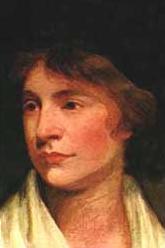 “In tracing the causes that have degraded woman, I have confined my observations to such as universally act upon the morals and manners of the whole sex, ... I only contend that the men who have been placed in similar situations have acquired a similar character.” “In tracing the causes that have degraded woman, I have confined my observations to such as universally act upon the morals and manners of the whole sex, ... I only contend that the men who have been placed in similar situations have acquired a similar character.”
| Thomas Paine (1737-1809)
English democratic and Deist journalist who formulated the concepts of civil liberty behind the American War of Independence and the French Revolution. Author of The Rights of Man.
[Biography]
General Carl von Clausewitz (1780-1831)
Prussian military theorist admired by Marx, Engels and Lenin.
[Biography]
Alexis de Tocqueville (1805-1859)
French diplomat who studied the development of democratic forms of society in America.
[Biography]
Moses Hess (1812-1875)
Leader of True Socialism, early associate of Marx.
[Biography]
George Washington Plunkett (1842-1924)
A leader of Tammany Hall, the corrupt local government group in 19th century New York.
[Biography]
Childe (1892-1957)
Early 20th century Australian Labor Party official.
|
 The Value_of_Knowledge archive includes classic works by over 140 writers from the Copernican Revolution up to the present time, centred on problems in the epistemology, the theory of knowledge. The Value_of_Knowledge archive includes classic works by over 140 writers from the Copernican Revolution up to the present time, centred on problems in the epistemology, the theory of knowledge.
|
Francis Bacon (1561-1626)
Founder of British Empiricism.
[Biography]
Rene Descartes (1596-1650)
Founder of French Rationalism.
[Biography]
Denis Diderot (1713-1784)
French materialist philosopher.
[Biography]
Percy Bysshe Shelley (1792-1822)
English poet and revolutionary-atheist.
[Biography]
G W F Hegel  (1770-1831) 50+ (1770-1831) 50+
The greatest philosopher of “German Idealism,” theorist of modern dialectics and the most important influence on Marx and Engels and essential to Marxism.
[Biography]
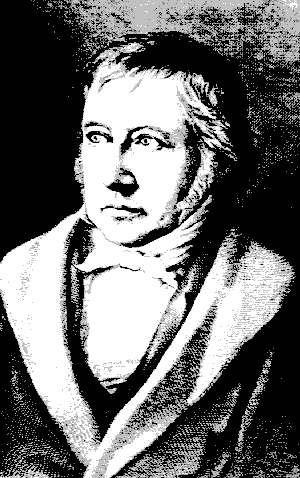 “The history of philosophy deals not with a past, but with an eternal and veritable present: and resembles not a museum of the aberrations of the human intellect, but a Pantheon of godlike figures, one after another in dialectical development.” “The history of philosophy deals not with a past, but with an eternal and veritable present: and resembles not a museum of the aberrations of the human intellect, but a Pantheon of godlike figures, one after another in dialectical development.”
Cyril Smith | Auguste Comte (1798-1857)
Founder of Positivism, an early advocate of the emancipation of women.
[Biography]
Ludwig Feuerbach (1804-1872)
German philosopher, materialist and atheist critic of Hegel, and an influence on the young Marx in the 1840s.
[Biography]
JB Baillie (18??-19??)
Scottish Hegelian, translator.
John McTaggart (1856-1925)
British Hegelian, principal translator and advocate for Hegel in the English langauge. Later abandoned Hegelianism.
[Biography]
GW Cunningham (1881-1968)
American Hegelian, Cornell University.
Rebecca Cooper
American Hegelian, University of Washington.
Benedetto Croce (1866-1952)
Important Italian Hegelian and socialist philosopher, one of the early advocates of Marxism in Italy, but became a reformist.
[Biography]
Max Weber (1864-1920)
German sociologist and political economist best known for his thesis of the “Protestant Ethic”; an early proponent of positivist sociology and historiography, theorised “status order” rather than class. Regarded by many as the main alternative to Marx; developed the concept of “ideal types.”
[Biography]
|
Liberation Epistemology
(1934-2001)
Recent Marxism
(1960-2003)
Ancient Dialectics
Lao Tzu 
(c. 500 BCE)
The Tao Te Ching is one of the first and finest examples in human history of the dialectical method of reasoning, here used towards a moral end.
[Biography]
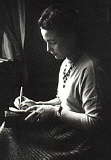 “Humanity is male and man defines woman not in herself but as relative to him; she is not regarded as an autonomous being.” “Humanity is male and man defines woman not in herself but as relative to him; she is not regarded as an autonomous being.”
| Classics of Ethics
(1673-1998)
Immanuel Kant (1724-1804) 10+
Founder of German Idealism whose works remain the foundations of secular Ethics.
[Biography]
————
Henry David Thoreau (1817-1862)
American liberal and romantic writer.
[Biography]
Friedrich Nietzsche (1844-1900)
German ethicist and existentialist philosopher.
[Biography]
Jean-Marie Guyau (1854-1888)
German ethicist and existentialist philosopher.
[Biography]
See Also: Robespierre, Simone de Beauvoir, Eugene Kamenka.
|
 Political Economy grew out of moral philosophy in the late 18th century as a new and distinct branch of science, dedicated to understanding how people can live. The critical study of the political economists absorbed much of Karl Marx's life. Political Economy grew out of moral philosophy in the late 18th century as a new and distinct branch of science, dedicated to understanding how people can live. The critical study of the political economists absorbed much of Karl Marx's life.
|
Adam Smith  (1723-1790) (1723-1790)
Originally a moral philosopher, became the greatest of the British political economists; first to develop a labour theory of value.
[Biography]
Thomas Malthus (1766-1834)
British political economists who theorised economic basis for development of society, and infamous for his reactionary theory of population.
[Biography]
John Stuart Mill (1806-1873)
Contemporary and opponent of Karl Marx, English liberal theorist, early positivist and a Utilitarian in ethics.
[Biography]
Marxist Political Economy 1887-1995
Bernice Shoul (1920-1977)
U.S. Marxist Political Economist.
[Biography] | Frederick Taylor (1856-1915)
American management theorist who invented “scientific management.”
[Biography]
John Hobson (1858-1940) 15+
English, socialist economist who was a major theorist of imperialism, was somewhat of a centrist in politics.
[Biography]
J. M. Keynes  (1883-1946) (1883-1946)
British political economist who developed the theory of the welfare state & macroeconomic control of unemployment by public spending.
[Biography]
Classics of Political Economy 1673-1936
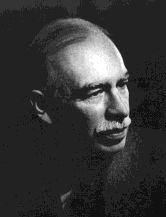 “The effect of combination on the part of a group of workers is to protect their relative real wage. The general level of real wages depends on the other forces of the economic system.” “The effect of combination on the part of a group of workers is to protect their relative real wage. The general level of real wages depends on the other forces of the economic system.”
|
 Marxists have always taken a keen interest in the development of the natural and social sciences and the philosophical problems arising out of science. Even scientists who have had conservative political views have contributed to revolutionary ideas. Marxists have always taken a keen interest in the development of the natural and social sciences and the philosophical problems arising out of science. Even scientists who have had conservative political views have contributed to revolutionary ideas.
|
Charles Darwin (1809-1882)
English biologist who formulated the idea of evolution of species by natural selection.
[Biography]
Lewis Henry Morgan (1818-1881)
Anthropologist who formulated the idea of development of human society through definite stages corresponding to evolution of the forces of production.
[Biography]
Sigmund Freud (1856-1939)
Psychologist, founder of psychoanalysis.
[Biography] | Albert Einstein (1879-1955)
Discoverer of Theory of Relativity and the Quantum nature of energy; devoted his life to fight for peace and world government.
[Biography]
Foundations of Mathematics
(1911-1950)
Epistemology & Modern Physics
(1925-1958)
Classics in Psychology (1874-1989)
|



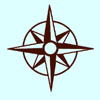 Navigate This Site
Navigate This Site Come and Hear™ Home
Come and Hear™ Home









 “
“

 “
“
 “
“




 “
“




 “
“



 “
“
 “
“









 “
“
 “
“
 “
“ “
“
 “The effect of combination on the part of a group of workers is to protect their relative real wage. The general level of real wages depends on the other forces of the economic system.”
“The effect of combination on the part of a group of workers is to protect their relative real wage. The general level of real wages depends on the other forces of the economic system.”








